- Home
- Parnell Hall
Puzzled to Death Page 3
Puzzled to Death Read online
Page 3
“Don’t tell me you don’t even know what the National Children’s Placement Fund is?”
“It’s a charity for kids. A national one. And it shut the gas-station jerk up. That’s good enough for me.”
“Aunt Cora, before you endorse something, you ought to know what it is.”
“Sherry, I know I got that brochure from an earnest-looking young girl outside D’Agostino’s handing out leaflets. Clean, presentable, attractive. An all-American girl.”
“Even so …”
“Sherry. Sweetheart. Relax. It’s a charity for kiddies.” Cora shifted gears, whizzed around a turn, smiled sideways at her niece. “What could possibly go wrong?”
THE PICKET SIGNS READ, NO MONEY FOR SEX!!!, DON’T ENDORSE PROMISCUITY!, UP WITH ROE V. WADE!, DEFEND OUR RIGHT TO CHOOSE!, DOWN WITH SMUT!, and JUST SAY NO TO PORN!!! The women who carried the signs marched back and forth in front of First Selectman Iris Cooper’s office window with grim-faced energy.
Harvey Beerbaum was properly aggrieved. “I assure you, I had nothing to do with this.”
“I’m sure you didn’t,” Iris Cooper answered. “That’s not the point.”
“It is to me. I have a reputation. I am thinking of posting a disclaimer on my Web site.”
“A disclaimer?” Iris Cooper’s shrewd eyes narrowed. “You’re disclaiming the tournament?”
“No, just the charity. I mean, really.” Harvey rolled his eyes, looked at Cora Felton. “There are pickets out there.”
The National Children’s Placement Fund had turned out to be an organization devoted to helping single mothers. While the goals of the organization seemed beyond reproach—providing relief for children born without fathers, helping the mothers get back on their feet again, and placing unwanted children in foster care—the aim of the organization was still aiding unwed mothers, and the virtuous citizens of Bakerhaven were up in arms. Enough of them, at least, to cause an embarrassment to First Selectman Iris Cooper, who had to wade through picket lines to get to her office.
The first day there had been only two protesters. The next day there were four. But today the sky had fallen. It had finally dawned on someone that the National Children’s Placement Fund, if not out and out encouraging young women to go out and get pregnant, as some of the picket signs proclaimed, did provide funds for pregnant young women to complete their pregnancies and place the children up for adoption. It was therefore seen as a pro-life, antiabortion fund, with all the resultant controversy those powder-keg words engendered.
Today there were nearly twenty pickets.
And so, in one fell swoop, Cora Felton, in her one and only contribution to the Bakerhaven Charity Crossword-Puzzle Tournament, had managed to offend both the right- and left-wing factions in town, pleasing absolutely no one.
“And you want to know the worst part,” Iris Cooper said, looking up from the two petitions that lay on her desk calling for the tournament to drop the charity, “the worst part is it’s in print.” Iris picked up a copy of the brochure that had been mailed out the previous week. “It’s in our brochure. It’s in our ads. It’s in the letters that went out to the contestants. It’s in the entrance forms they signed to participate. We’re a laughingstock.”
“I had no idea,” Cora Felton said.
“Of course you didn’t,” Iris said. “You’re from the city, where these things are a matter of course. You give to a charity, it’s no big deal. And if it turns out later that charity is running guns from South America, that’s hardly your fault.”
“Guns?”
“Just an example. But you see what I mean?”
Cora didn’t. Cora was beginning to get a headache, just as she had every time in the last few weeks that the Bakerhaven Charity Crossword-Puzzle Tournament was mentioned. Now that it was just days off, Cora treated it like a trip to the dentist. She just wanted to get it over with.
If she had to.
“You wanna cancel?” Cora ventured hopefully.
“Oh, sure,” Iris Cooper scoffed. “That’s all we need to make ourselves look like total jackasses. We put this thing together, publicize it, screw it up, and quit.” She pointed out the window. “Leaving those lamebrains to glory over their victory. You want them giving interviews? I can see tomorrow’s headlines: SELECTMEN CAVE IN, CANCEL X-RATED FUND-RAISER.” Iris grimaced. “No, we ride it out, proud and strong. We’re helping children, that’s all we know, and all we wanna know.”
“We’re funding the mothers,” Cora pointed out.
“Who could be immaculately conceived, for all we know.” Iris Cooper made a horrible face. “Please, don’t anyone blurt that out.”
“I most certainly won’t,” Harvey Beerbaum said prissily. “The mothers aren’t immaculately conceived, the children are.”
The look Iris Cooper gave him could have killed a bull moose, but Harvey Beerbaum took no notice.
“So,” Iris said tartly, “how are we doing with registration?”
Harvey Beerbaum snapped open his briefcase, took out a folder, cleared his throat. “So far we have eighty-seven contestants.”
Iris Cooper looked stricken. “Eighty-seven? Did I hear you right?”
“So far.”
“The tournament’s this weekend.”
“And we’ll be accepting registrations through Friday night.”
“Are you expecting a last-minute turnout? We have space for three hundred contestants.”
“It’s a small, regional convention. This kind of thing is not that well attended.”
“You didn’t tell me that when you proposed it!”
“The precise attendance is not important. What’s important is goodwill.”
Iris Cooper raised her eyebrows at the pickets out the window but said nothing.
“Actually,” Harvey hastened to assure her, “the protesters will probably get us more press than we would have gotten on our own.”
“Not exactly the kind of press we want.”
“There’s no such thing as bad press. With the right spin, we come off as a civic-minded town, doing good work, despite the impediment of a few misguided kooks.”
“Uh-huh,” Iris Cooper said.
If Iris believed that, Cora Felton wouldn’t have known it. Still, Cora felt grateful to have such strong support for her charity from Harvey Beerbaum. At the same time, she resented Harvey Beerbaum for supporting her position, feeling it shouldn’t be her position to begin with. After all, the whole tournament was never her idea, and choosing a charity was never her idea, and it was entirely Harvey Beerbaum’s fault she’d been roped into the whole mess in the first place.
Cora Felton sighed.
“What about the big names?” Iris Cooper asked Harvey. “How many celebrities have you got lined up?”
“I have Paul Thornhill, Craig Carmichael, and Zelda Zisk.”
Iris Cooper frowned. “That’s the same list as before. I thought you were working on others.”
“I also have Ned Doowacker lined up.”
“Who?”
“Another well-known contestant.”
“You never mentioned him before.”
“No, I just snagged him.”
Iris Cooper was losing her patience. “What about the others you were trying to get? The very famous ones. Just who were they again?”
“Jon Delfin, Ellen Ripstein, and Trip Payne.”
“That’s right. What about them?”
“They had conflicts.”
“All of them?”
“It was unfortunate.”
“Wait a minute,” Iris protested. “You said December fifth was an open date. You picked it yourself. To test availability. If no one was available, the date could change.”
“Yes, and it certainly would have changed if it had done us any good. The celebrities I lined up were available for December fifth.”
“Are they as famous as the other ones?”
“They are certainly well-known in the crossword-puzzle community,” Harv
ey replied placidly.
“Are they finalists from the national tournament?”
“I believe Craig has been a finalist.”
“Then they’re not superstar finalists, like the ones you couldn’t get. I thought your TV coverage was going to attract the big names.”
“Actually,” Harvey admitted, “Ellen, Jon, and Trip were interviewed on Nightline at the national convention. Which is sort of where I got the idea.”
“Oh, is that right?” Iris Cooper said scathingly. “I don’t recall you mentioning that before.”
Cora Felton put her hand over her mouth to hide her delight. Harvey Beerbaum was clearly getting the worst of it, and Cora was actually beginning to enjoy herself—before Chief Harper broke up the meeting by driving right through the picket line with his siren on to deliver a murder suspect to the county court.
“A MURDER?” SHERRY CARTER SHOWED MORE INTEREST in homicide than she normally would. Her aunt had been so depressed about the tournament debacle she figured it would take a good murder to cheer her up.
Apparently this wasn’t a good one.
Cora Felton made a face. “I suppose you could call it that. It’s really a domestic tiff.” Cora jerked the pitcher of tomato juice out of the refrigerator.
“The crime is so ordinary it’s driving you to drink?” Sherry observed.
“That’s not far off.” Cora gathered her spices, assembled them on the butcher-block table. “Now where did I leave my glass? Oh, yes, next to the vodka. And did I put the vodka in?”
“You put it in.”
“It pays to be sure,” Cora Felton declared, adding another jolt. She carried the glass of tomato juice and vodka to the butcher block, began adding spices.
“So who got killed?” Sherry asked.
“Some housewife.”
“I see. And that’s not glamorous enough for you?”
“Not in this case.”
“Why not?”
“Her husband did it.”
“And this disappoints you because …”
“There’s no mystery. There’s no suspense. There’s no drama. The case is solved before it’s begun. Just an ordinary husband–wife thing, you know the kind I mean, so routine in New York City it wouldn’t even make the headlines. The only reason we’re talking about it at all is we’ve moved to this hick town where it’s big news if someone’s cow breaks a butter churn.”
“This is not a cow town.”
“Whatever.”
“And the phrase hick town is one I would like to see disappear from the Puzzle Lady’s vocabulary.”
“Of course, of course. I would never say that in public, Sherry. Just with you.”
“When you slug away vodka at your current clip, you sometimes forget your good intentions.”
Cora scowled. “Sherry. What are the rules?”
Sherry stood firm. “I’m not telling you what to drink. I’m pointing out that if you do, you’re less careful about what you say. So it would be good if there were certain phrases you were not in the habit of using, as they might have a tendency to slip out.”
“Fine,” Cora rejoined. “I’ll watch my tongue. This isn’t a hick town, or a cow town. It’s a one-horse town. I haven’t actually seen the horse, but I’ll assume they have one. If so, it’s probably the one they have that statue of in the middle of the village green—you know, the horse and rider with the plaque so worn you can’t tell who they are?”
“You have tomato juice on your lip.”
Cora grabbed a paper towel, dabbed her face.
“So, you gonna tell me about the murder?”
“I was trying to when you went off on the prohibition lecture.”
“Who got killed?”
“I told you. A housewife. Name of Judy Vale. Apparently she had a reputation.”
“Oh?”
“Town tart. Always running around on her husband, and him always beating her up. Joey Vale, that’s the husband, is a simpleminded lout, works a factory job in Danbury, isn’t home enough to keep his wife in line, so when he’s gone Judy plays around, and when Joey’s back he beats Judy up. This time he went too far.”
“He confessed?”
“I imagine. Last I saw he was weeping and moaning and tearing his hair.”
“You didn’t talk to Harper?”
“I had no chance. He was in with the prisoner getting him arraigned.”
“So where’d you get your facts?”
“Aaron Grant. He’s covering the story now. I’m hoping he’ll call you later on.”
“You planning on elbowing me away from the phone?”
“Don’t be dumb. I’m sure you’ll know what to ask. Like I say, it’s no big deal.” Cora took a pull on her Bloody Mary. “Not like this puzzle contest you got me roped into.”
“I got you roped into?”
“If you’d admit writing the column—”
“We’ve been through all that.”
“I remember the conversation. That was before I chose a charity. I remember you saying it didn’t matter which charity I chose. Well, guess what? It matters a lot.”
“It never occurred to me you’d pick a charity you didn’t know.”
“You don’t think I should back the charity?”
“No, I think you should. I just think you should have known you did.”
“Sherry, that’s convoluted even for you.”
“You’re sitting here grousing that you didn’t know what this charity was. Wrong. Your position is you knew perfectly well what the charity was, and what’s wrong with that?”
“The Puzzle Lady takes a stand on abortion?”
Sherry frowned. “How is this about abortion?”
“Oh, you didn’t hear that wrinkle?”
There came the sound of a car in the driveway.
“Ah,” Sherry said. “Maybe that’s Aaron.” She was eager to rouse her aunt out of the our-life-is-hell-because-of-the-puzzle-contest-so-I’m-drinking-myself-into-oblivion mode.
Sherry went to the living-room window, peered out. A Honda Accord was coming up the drive.
“Yeah, that’s him,” Sherry said. “Good. We’ll get the news.”
The Honda pulled to a stop beside Cora’s red Toyota and the driver got out.
Sherry’s mouth fell open.
It was not Aaron Grant.
It was Aaron’s high-school sweetheart, former girlfriend, and current admirer, if Sherry was any judge of character, for even Sherry had to admit her views on Becky Baldwin were somewhat biased. Becky was her rival, her goad, her nemesis. Sherry couldn’t believe it. Becky Baldwin coming to see her? But there she was, tripping up the path with her exquisitely shod feet, her blond curls framing her perfectly plucked eyebrows, so perfectly plucked one couldn’t tell they were, her trim and youthful figure only slightly encumbered by the stylish cut of the winter business suit that looked tailor-made, but that, Sherry realized with a pang of envy, Wonder Woman had most likely purchased off the rack.
Good Lord. In public Becky Baldwin and Sherry Carter were barely civil. There was no question as to how they felt toward each other. Why on earth would Becky Baldwin be calling on her now?
She wasn’t.
When Sherry Carter opened the front door, Becky smiled, a frosty, reserved smile, and said, “Hello. Is your aunt in?”
Sherry Carter blinked. “Yes.” After a moment she added, “Won’t you come in.” Sherry smiled when she said it. Still, there was no masking the impression the words had been painfully extracted from her. Sherry stepped aside, said, “Cora, Becky Baldwin’s here to see you.”
“Is that so?” Cora said, coming to Sherry’s aid. “Well, in that case, let’s bring her in the kitchen.” Cora escorted Becky through the living room, talking as she went. “It’s the only room in the house where you can really sit down. I mean, look at this mess. It’s not like we just moved in, but we still haven’t unpacked. I guess a part of me can’t believe I really left New York. Now, this,” Cora said,
entering the kitchen, “on the other hand, is a bit of all right. It’s the main reason we took the house. Not that I can cook, mind, but Sherry’s a regular Julia Child. And it’s a great place to hang out. Would you care for a drink? I’m having a Bloody Mary, but we also have coffee.”
“Ah, thank you, no. This isn’t a social visit. The fact is, I need your help.”
“My help?”
“Exactly,” Becky said. “I’m the attorney for Joey Vale. He’s just been arrested for the murder of his wife.”
“You’re representing him?” Sherry said skeptically.
“Is that so surprising? I’m basically the only game in town.”
“Yes, I know,” Sherry said, and cursed the fact. Becky had been visiting her old home town several months earlier when circumstances had conspired to make her stay. She had wound up practicing law in Bakerhaven. “I just mean, what can you do? Isn’t it an open-and-shut case?”
“No case is open-and-shut,” Becky replied grimly. “Even if my client were guilty and the police had all the evidence in the world against him, there would still be room to maneuver. Not that that’s the case. Personally, I believe my client’s innocent, and I mean to get him off.”
“That’s the spirit,” Cora applauded. “I don’t believe it for a minute, but it’s the proper attitude to take.”
“Which is where you come in,” Becky Baldwin said.
Cora frowned. “What do you mean, me?”
“I need help,” Becky said. “There are no private investigators in town. I can’t afford to hire someone out of Hartford or Danbury and pay the travel time. It isn’t cost-effective. It makes no sense. You, on the other hand, are right here.”
Cora’s blue eyes had widened. “You wanna hire me?”
“I need a private eye. You’re the closest thing Bakerhaven’s got.”
Cora shot a glance at Sherry, didn’t like what she saw. “I got bad news, Becky,” she said dutifully. “I’m not for hire.”
“I never thought you were,” Becky Baldwin said. “I just thought it would appeal to you. I mean, here’s a man going to be tried for his wife’s murder. You know the investigation’s going to be inadequate. Not their fault—the police don’t have the manpower, they can’t do the job. The true facts may never come to light.”

 Clicker Training
Clicker Training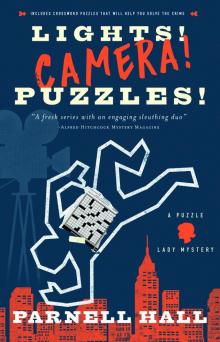 Lights! Camera! Puzzles!
Lights! Camera! Puzzles!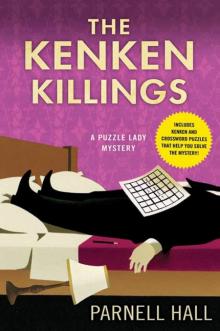 The KenKen Killings
The KenKen Killings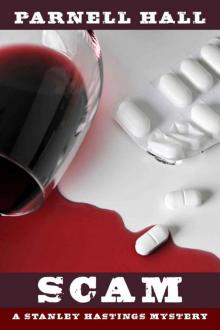 12-Scam
12-Scam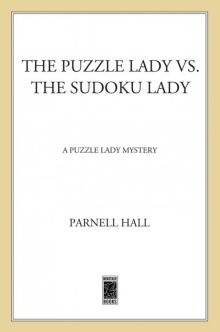 The Puzzle Lady vs. the Sudoku Lady
The Puzzle Lady vs. the Sudoku Lady 2 Murder
2 Murder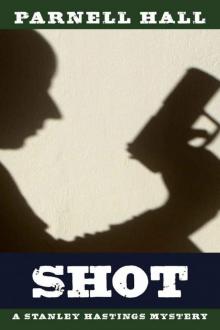 7 Shot
7 Shot You Have the Right to Remain Puzzled
You Have the Right to Remain Puzzled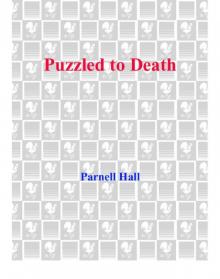 Puzzled to Death
Puzzled to Death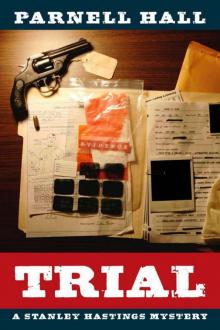 11-Trial
11-Trial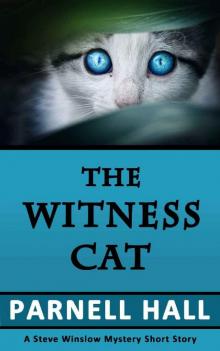 The Witness Cat (Steve Winslow Mystery)
The Witness Cat (Steve Winslow Mystery)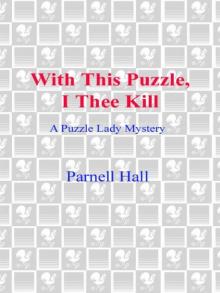 With This Puzzle, I Thee Kill
With This Puzzle, I Thee Kill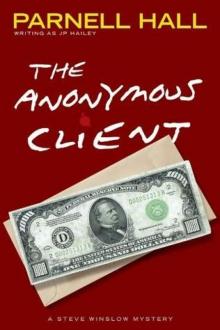 The Anonymous Client sw-2
The Anonymous Client sw-2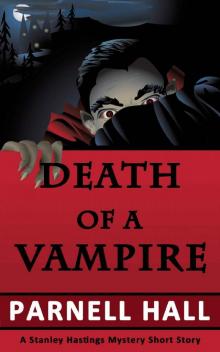 Death of a Vampire (Stanley Hastings Mystery, A Short Story)
Death of a Vampire (Stanley Hastings Mystery, A Short Story)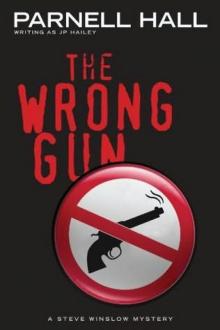 The Wrong Gun sw-5
The Wrong Gun sw-5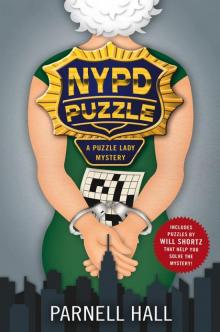 NYPD Puzzle
NYPD Puzzle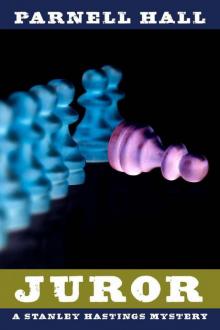 6 Juror
6 Juror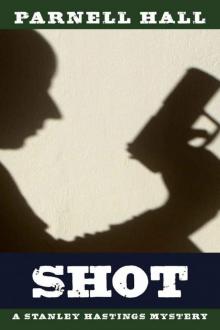 07-Shot
07-Shot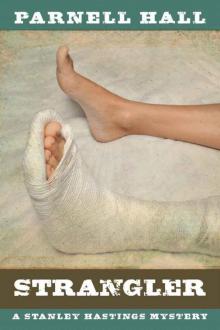 04-Strangler
04-Strangler 02-Murder
02-Murder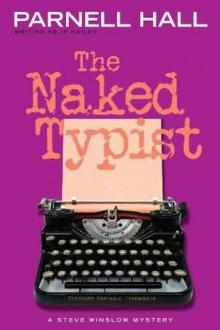 SW04 - The Naked Typist
SW04 - The Naked Typist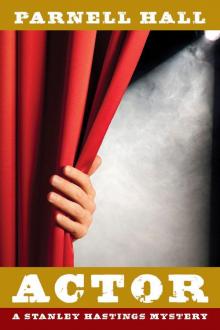 Actor
Actor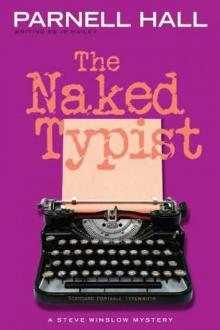 The Naked Typist sw-4
The Naked Typist sw-4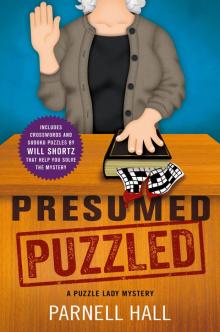 Presumed Puzzled
Presumed Puzzled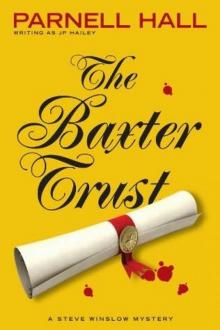 SW01 - The Baxter Trust
SW01 - The Baxter Trust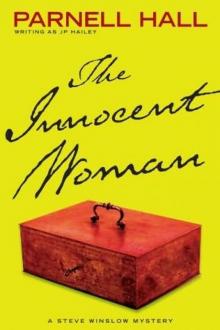 SW06 - The Innocent Woman
SW06 - The Innocent Woman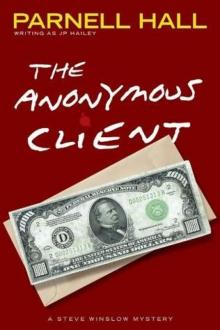 SW02 - The Anonymous Client
SW02 - The Anonymous Client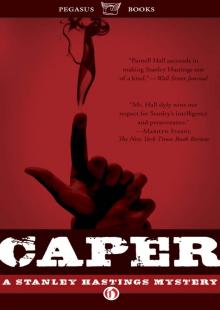 Caper
Caper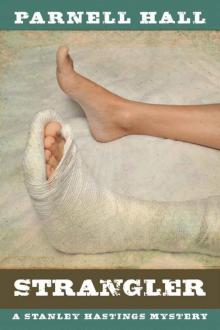 4 Strangler
4 Strangler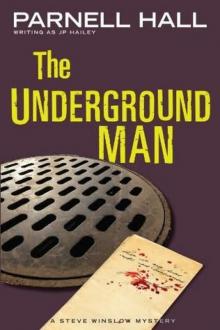 The Underground Man sw-3
The Underground Man sw-3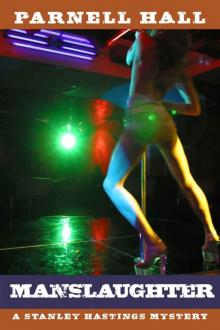 Manslaughter (Stanley Hastings Mystery, #15)
Manslaughter (Stanley Hastings Mystery, #15)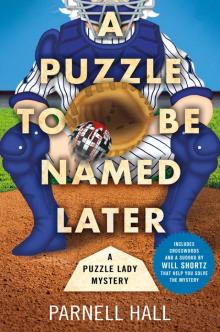 A Puzzle to Be Named Later--A Puzzle Lady Mystery
A Puzzle to Be Named Later--A Puzzle Lady Mystery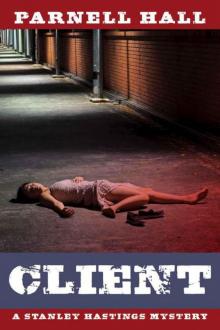 05-Client
05-Client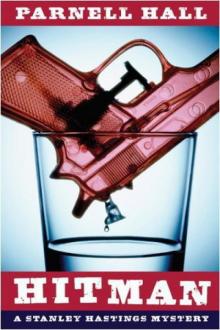 16 Hitman
16 Hitman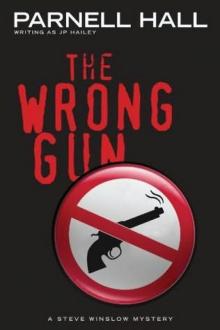 SW05 - The Wrong Gun
SW05 - The Wrong Gun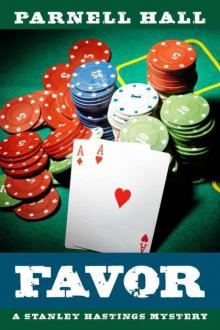 3 Favor
3 Favor Last Puzzle & Testament
Last Puzzle & Testament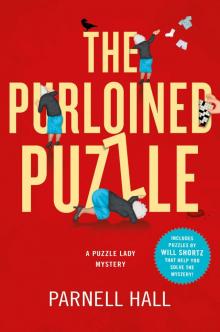 The Purloined Puzzle
The Purloined Puzzle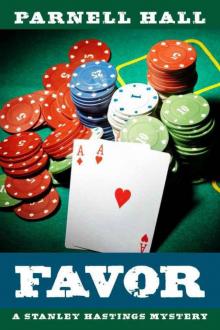 03-Favor
03-Favor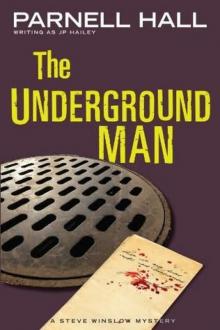 SW03 -The Underground Man
SW03 -The Underground Man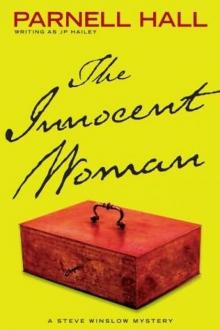 The Innocent Woman sw-6
The Innocent Woman sw-6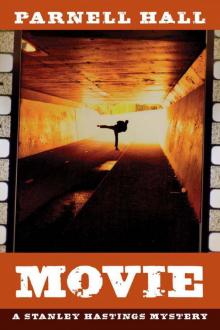 10 Movie
10 Movie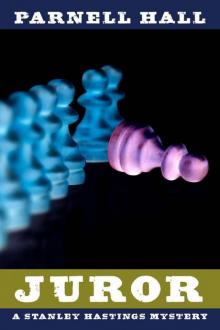 06-Juror
06-Juror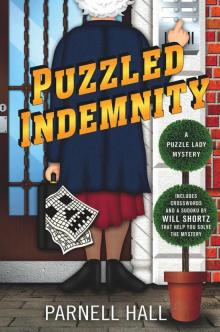 Puzzled Indemnity
Puzzled Indemnity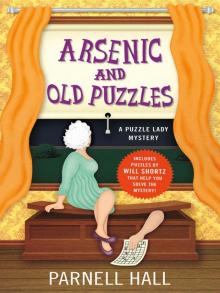 Arsenic and Old Puzzles
Arsenic and Old Puzzles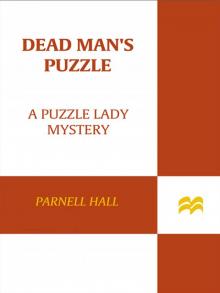 Dead Man's Puzzle
Dead Man's Puzzle Safari
Safari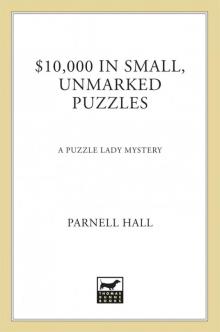 $10,000 in Small, Unmarked Puzzles
$10,000 in Small, Unmarked Puzzles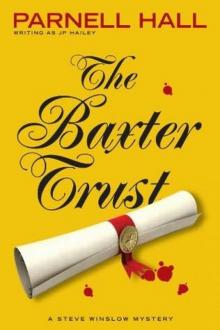 The Baxter Trust sw-1
The Baxter Trust sw-1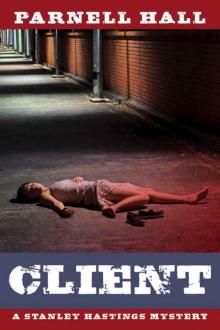 5 Client
5 Client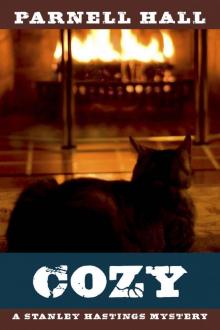 Cozy (Stanley Hastings Mystery, #14)
Cozy (Stanley Hastings Mystery, #14)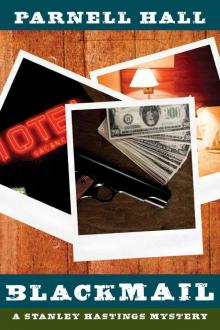 Blackmail
Blackmail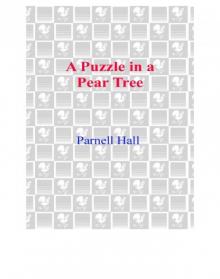 A Puzzle in a Pear Tree
A Puzzle in a Pear Tree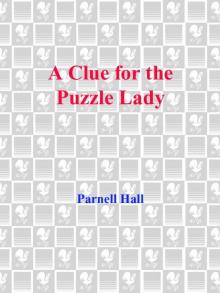 A Clue for the Puzzle Lady
A Clue for the Puzzle Lady Clicker Training (Stanley Hastings Mystery, A Short Story)
Clicker Training (Stanley Hastings Mystery, A Short Story)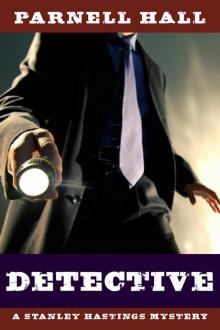 Detective (Stanley Hastings Mystery Book 1)
Detective (Stanley Hastings Mystery Book 1) 13 Suspense
13 Suspense